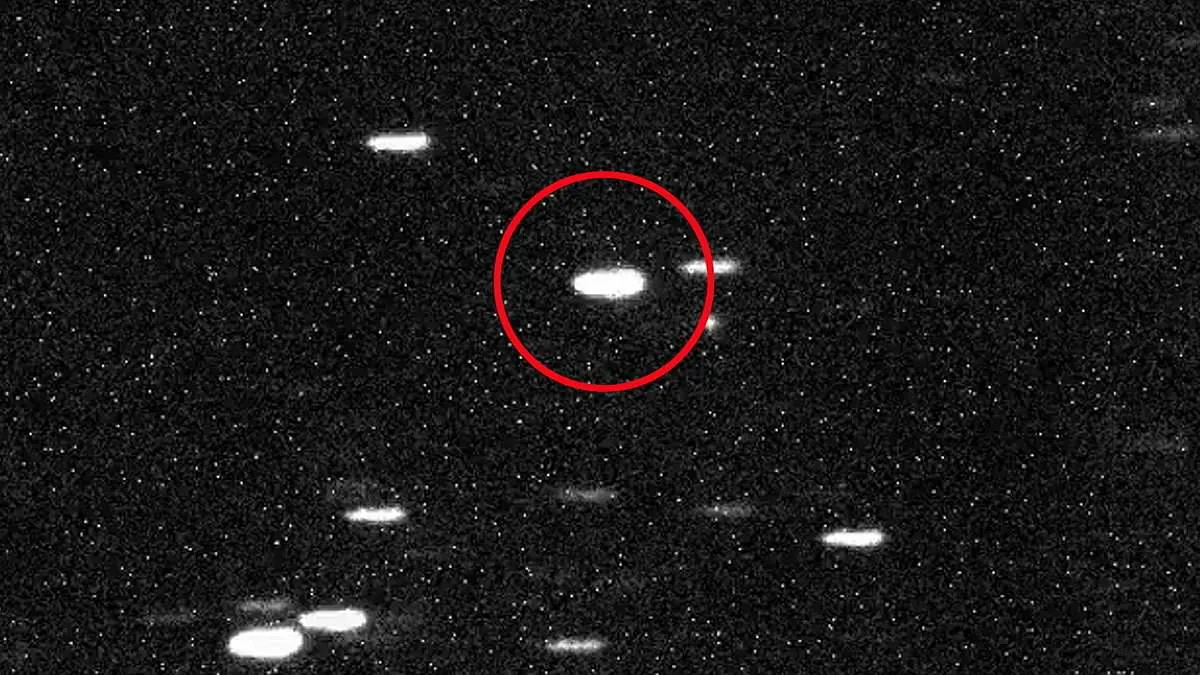
A prominent Harvard astrophysicist, Professor Avi Loeb, has made headlines by claiming that a mysterious object traversing our solar system could potentially be a nuclear-powered spacecraft. This assertion comes from his role as the director of the Galileo Project, an initiative dedicated to the search for extraterrestrial intelligence. The interstellar object in question, known as 3I/ATLAS, exhibits unusual characteristics that challenge NASA's classification of it as a typical comet.
One of the key indicators pointing to the extraordinary nature of 3I/ATLAS is its apparent ability to generate its own light. Professor Loeb suggests that this illumination may stem from a source of nuclear energy on the surface of the object. This intriguing observation was captured in a recent photograph taken by the Hubble Space Telescope on July 21, where a glowing area was noted on the side of 3I/ATLAS that faces the sun.
Loeb explained the significance of this observation: “Usually, for comets, you see a cometary tail trailing behind as it's being pushed by radiation from the sun, causing dust particles to lag behind. In this case, however, we observe a glow in front of the object,” he told NewsNation.
Despite Loeb's compelling arguments, not all scientists agree with his conclusions. Chris Lintott, an astronomer from the University of Oxford, dismissed the notion that 3I/ATLAS is an artificial object, describing such claims as “nonsense on stilts.” He emphasized that these assertions undermine the vital work being conducted to understand this celestial body.
Professor Loeb himself has acknowledged that the most probable outcome is that 3I/ATLAS is simply a large comet, similar to the interstellar comet 2I/Borisov, which passed through our solar system in 2019. He noted that as the object approaches Earth later this year, scientists will gain clearer insights into its true nature.
The object is slated to make its closest approach to Earth on December 17, 2023, before departing our solar system in early 2026. Until that time, Loeb maintains that his assessments are grounded in observational data. He highlighted the peculiarity of the light signature emitted by 3I/ATLAS, arguing that for a natural comet to produce such brightness, it would have to be over 12 miles long. Furthermore, he noted that it is improbable for such a massive object to exist freely in interstellar space, given the scarcity of rocky material available.
Loeb stated, “There isn't enough rocky material in interstellar space to deliver a rock of that size earlier than 10,000 years from now, leading to the question: what is it?”
As the Frank B. Baird Jr. Professor of Science at Harvard, Loeb also pointed out that the trajectory of 3I/ATLAS suggests it may have been guided by an unknown intelligence. The object is projected to follow an unusual path that brings it close to three planets: Venus, Mars, and Jupiter. Loeb argued that the odds of a natural celestial rock randomly following such a unique trajectory is less than 0.005 percent, or one in 20,000.
“This indicates that perhaps it was designed by some intelligence,” Loeb asserted. “I’m not saying it was actively steered, but the trajectory itself appears to be intentional.”
In light of these findings, Loeb revealed that he has been in discussions with Florida Congresswoman Anna Paulina Luna, who leads the House Oversight Committee's task force on declassifying information related to unidentified anomalous phenomena (UAPs). According to Loeb, Luna has reached out to NASA with a proposal to divert the Juno space probe, currently orbiting Jupiter, to intercept and investigate 3I/ATLAS.
However, not everyone is in favor of this idea. Investigative journalist Ross Coulthart expressed skepticism about diverting existing spacecraft like Juno, warning that Loeb’s hypothesis of 3I/ATLAS as a nuclear spacecraft is not widely supported in the scientific community. “It's inflammatory, and frankly, there's not a lot of evidence for it,” he stated.
Coulthart suggested that Loeb's theory stems from frustration over the lack of federal funding for extraterrestrial intelligence research. Earlier this year, Loeb was a guest speaker at Congresswoman Luna's hearing on UAPs, advocating for increased resources to pursue the search for extraterrestrial signals and UFO detection.